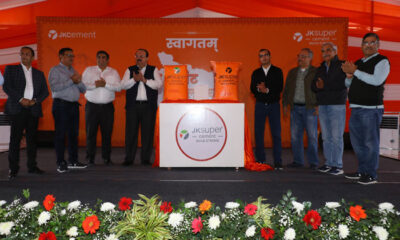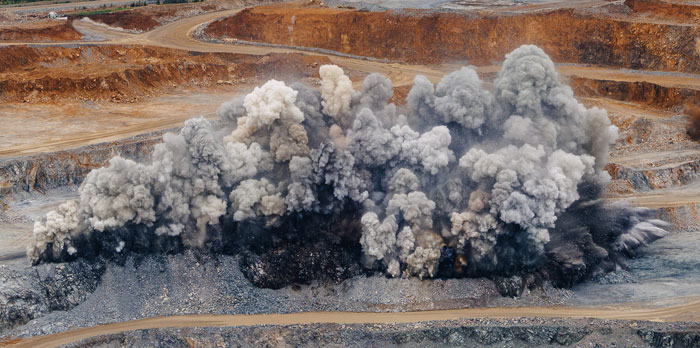Economy & Market
Oil and grease barrels should be kept indoors
Published
2 years agoon
By
admin
In this insightful interview, KB Mathur, Founder and Director, Global Technical Services, emphasises the importance of maintaining clean lubricants and leveraging advanced technologies for optimal plant operations and cost efficiency.
How is the Total Lubrication Management system relevant for the Indian cement industry?
Lubricating oil in a machine is like blood in the human body. Cement industry in India or anywhere in the world operates in dust conditions and their mines operate under heavier dust conditions. Keeping lubricants (oil and grease) clean as possible is the prime requirement for the machine’s operations and maintenance. This is our fundamental approach for providing services of ‘Total Lubrication Management’ to the cement industry.
Hence, a major factor for keeping lubricants in good condition and clean starts from storage, handling and dispensing of lubricants in a cement plant.
Our company, Global Technical Services (GTS) is working at several sites to ensure clean lubricating oil and grease are fed to machines. This is a primary requirement of machine life, reliability and continuous production.
We have developed special containers with colour coding to feed clean and uncontaminated oils to various machines in plants and mines. We call these containers ‘Dust Free Containers’ and they are colour coded for various families of lubricating oils – such as hydraulic oils, gear oils, etc.
We work according to our standard operating procedures (SOP) and the main activity is to keep the oil / grease clean, so that we achieve improved reliability in the plant operation and improved mechanical maintenance. This is of great importance and shall lead to productivity and improved profitability to our customers operating cement plants and mines.
How does automation and technology come handy in setting up the lubrication process at a cement plant?
Cement plants operate under very stringent conditions as they are process plants – working continuously for months or years. A dedicated team of lubrication technicians is required to keep and adopt good lubrication practices and lubricants in clean condition. Periodical testing of lubricants is required to ensure lubricating oils are in good condition. This is done at an oil testing laboratory.
When a used oil sample is sent to an oil testing laboratory, the test report is normally received after 7 to 10 days. However, in case the test report is not received within 48 hours – the mechanical damage can set into the machines, hence GTS has a site oil testing laboratory at all sites where GTS is working and implements Total Lubrication Management. The site oil testing laboratory provides the test report within 36 hours and corrective maintenance action can be taken. This is a vital need of Lubrication Management Services at cement plants and mines.
To keep oil clean, fifth generation oil filtration systems are required. The new technology for oil filtration for removing water/moisture, besides contamination, is adopted by GTS in the filtration machine. Used oil is filtered and produced oil free of moisture and cleanliness can be measured by ISOVG 4406 Spec., which needs hydraulic oil to be cleaned to NASS 6-7 values, the need for hydraulic oil cleanliness.
With the arrival of Inductively Coupled Plasma (ICP), the oil analysis can lead to meaningful results through ICP, which can give accurate reports on wear metals and total contamination besides additive depletion in the oil. With this, we can adopt a proper filtration system cleaning the oil and bring it to the level of ‘As New Oil’. Once this is adopted it can lead to oil conservation of oil to the extent of 30 to 40 percent. Oil conservation is an important need of the day, as we at GTS always work towards – ‘Save Oil – Oil will not last forever’.
What impact can proper lubrication create on the cost efficiency and productivity of cement plants?
Good lubrication practices are very important for cement plants and their mining operations for the following reasons:
- They are continuous process plants, and run for a year continuously and stop only during scheduled shut down
- They operate under very dusty conditions
- All cement plants have heavy rotary equipment such as raw mills, kiln, cement mills, etc.
- The operating conditions are stringent like high temperature, dusty environment, etc.
The above operating facts offer challenges for establishing ‘good lubrication practices’, so that cement plant’s reliability can be maintained. Hence, good lubrication is of paramount importance for operation of cement plants.
A basic requirement is to maintain quality of lubricants and greases manufactured by standard and reputed oil companies. The specification of the oil is therefore to be maintained and oil to be kept in clean condition to avoid any contamination with dust, dirt or moisture. This contamination has to be kept under control for good mechanical maintenance. Any breakdown in cement plant operation is very costly, affecting production.
Therefore, it is essential for cement plants to invest in good lubrication practices by having dedicated manpower, doing lubrication, keeping oil clean by use of filtration machines, oil testing laboratory at site, to ensure quality of oil as per specifications and take corrective action, when required.
How do you maintain quality for the lubricant products provided to the cement manufacturers?
Oil and grease barrels should be kept indoors. If space limitations make it impossible to keep all the oil barrels indoors, then the grease barrels must be kept indoors. The oil stored in outdoor barrels should be kept between 30°C and 90°C, covered with tarpaulin, or placed under a shed specifically developed for outdoor oil storage. Grease barrels cannot be kept outdoors because grease is a suspension of oil in soap. If grease barrels are stored outdoors, the heat will cause the oil and soap to separate, making the grease unfit for use.
Oil received from suppliers should be handled carefully at the site to prevent any barrels from being damaged during unloading. If barrels are not carefully unloaded, they can be damaged, causing oil to spill. GTS takes utmost care to ensure that the oil in service is as clean as possible, without any contamination. This ensures good maintenance practices and the reliability required in any industry, especially in cement plants, which operate in dusty environments.
The storage, handling and dispensing of lubricants and greases are very important because the oil is produced under high-quality control by the oil companies. After the oil is received and stored carefully, ensure there is no contamination from barrel breathing. The oil should then be dispensed to the machines using suitable containers, preferably dust-free containers with colour coding. Cement plants should not use open-mouth conical containers, as these can accumulate dust from the cement industry environment.
GTS has specifically developed containers called ‘Dust-free Containers’, which are colour-coded for different families of oil: hydraulic oil (blue), gear oil (green), and engine oil (red), among others. GTS uses its own colour-coding system to ensure that the lubricating oils, which are fed to the machines, are contamination-free.
How often do you audit or review your implemented systems?
We conduct regular reviews of each site where we provide Total Lubrication Management Services:
- Greasing in the plant is a major activity. Greasing schedules are monitored daily, and any deviations must be corrected the next day.
- Oil sample testing is done at the site laboratory and the main laboratory for detailed analysis, where ICP testing is required. The number of samples to be tested depends on the size of the plant and mines, and these samples are audited monthly.
- Total oil filtration is performed and used in plant machines after testing (weekly review).
- Oil conservation is important as it helps control oil wastage.
- Oil and grease consumption is reviewed on a weekly and monthly basis, with trend analysis conducted.
The above parameters are reviewed at the site on a weekly and monthly basis as well as at our Mumbai office.
The GTS Site In-charge provides this information to the TLM Coordinator at the site on a daily basis. We provide weekly and monthly reports to the entire Plant Management team, which we call the Monthly Technical Activity Report (MTAR).
We work in association with the TLM Coordinator on a daily basis. The TLM Coordinator serves as the primary contact person from the mechanical and maintenance department of each plant where we provide our services. Additionally, we have Standard Operating Procedures (SOP) that detail every activity to be performed at the site. A copy of the SOP is available at every plant with the unit head, mechanical head, and TLM Coordinator. The SOP incorporates every system of our work, ensuring smooth implementation of lubrication management at the plants and their mines.
How do you incorporate sustainability in your process and operations?
Sustainability is one of the most important requirements today in any industry. We have mentioned earlier that ‘Oil Never Dies’ and also ‘Oil will not last forever’. Hence, handling oil carefully without any spillage or wastages or leakages is of paramount importance while handling and dispensing of lubricants into the machines. In case the oil is not handled with utmost care as per the prescribed norms, it can lead to spilling, which will lead to loss of oil and slippery floors.
One of the major requirements today for technicians using lubricants, whether petroleum-based or synthetic, is to completely eliminate oil spillage through careful handling, in order to achieve sustainability. We place a significant emphasis on oil conservation and also adopt the principles of Reduce, Re-use and Recycle. Implementing these practices could result in saving at least 30 per cent to 40 per cent of lubricants in any industry.
We must do used oil filtration and test filtered oil within the site laboratory and accordingly using it for top-up or any other use as per the test report, will save considerable number of lubricants in the industry. In future, oil recycling is going to be the major activity and will be required to be done at all the plants. A cost reduction is important to save lubricants for sustainability.
We cannot afford to throw out oil due to ecological/environmental reasons and therefore reclamation of used oil is a highly focused area and will have a big effect on sustainability, besides reducing costs in manufacturing.
We make best efforts to save lubricating oil by testing oils regularly in the laboratory. In the cement industry, there are many locations where loss of application is required using oils / greases such as chain, pulleys, etc. and where used oil beyond filtration can be used for all loss applications.
What are the major challenges that you have had to face and overcome in terms of lubrication for the cement industry?
We initiated Total Lubrication Management Services for the cement industry approximately
23 years ago, in the year 2001-02. It is now well-established, and we do not face any major challenges in the cement industry because the personnel working in the industry understand the importance of Total Lubrication Management on a Single Window Basis at their plants.
Initially, our challenges included setting up a robust Central Lubrication Cell (CLC), which serves as a single location for carrying out the work of Total Lubrication Management for the entire plant. Now, these facilities are standardised and accepted by most plants. For mines included in our scope, we set up a separate CLC due to distance.
The CLC is where we operate Lubrication Management services for the entire plant (or mines). We maintain a 15-day inventory of oil and grease at the CLC. Handling and dispensing of lubricating oils or greases are conducted from this location, along with the setup of an Oil Testing Laboratory at the site for the Central Lubrication Cell of the Plant. Hence, this area is specially built to cater to all our activities. We prioritise maintaining ‘good housekeeping’ at the CLC to ensure clean oil is fed to machines.
Maintaining good housekeeping at the CLC is our prime requirement. Additionally, our next challenge is manpower. We have to train them according to our needs, and finding competent manpower has become increasingly difficult. Sometimes, our manpower has to work for 14 to 16 hours. Apart from this, we have no other major problems in implementing Total Lubrication Management at various sites.
Tell us about the innovations that can be seen in the near future by Global Technical Services.
We wish to achieve the following in the cement industry in the near future.
- We have already initiated a training programme for GTS personnel/technicians at sites to enhance the quality of our day-to-day services in providing Total Lubrication Management as per our SOP.
- The cement industry utilises large quantities of lubricating oils, primarily gear oil and hydraulic oils. These oils can be regenerated to the level of ‘As-New Oil.’ Since we have an on-site oil testing laboratory, the regenerated lubricants/oils can be tested and reused. This will provide a significant and cost-effective service, allowing us to save a considerable amount of lubricating oil in the industry. To achieve this objective, we will utilise 5th generation oil filtration systems. These systems absorb water/moisture as well as all suspended impurities, wear debris, etc.
- With the availability of sensors and software, we aim to implement online oil condition monitoring for all critical and major equipment in the cement plant. This will enhance mechanical maintenance as a continuous process, which is a major expense in any industry.
– Kanika Mathur

You may like
-


Our strategy is to establish reliable local partnerships
-


Compliance and growth go hand in h and
-


JK Cement Crosses 31 MTPA Capacity with Commissioning of Buxar Plant in Bihar
-


Reliability is a key focus for us
-


We deploy carbon capture solutions
-


Ramco Cements Gets Andhra Pradesh Nod For Quartzite Mining

SEEPEX introduces BN pumps with Smart Joint Access (SJA) to improve efficiency, reliability, and inspection speed in demanding rock blasting operations.
Designed for abrasive and chemical media, the solution supports precise dosing, reduced downtime, and enhanced operational safety.
SEEPEX has introduced BN pumps with Smart Joint Access (SJA), engineered for the reliable and precise transfer of abrasive, corrosive, and chemical media in mining and construction. Designed for rock blasting, the pump features a large inspection opening for quick joint checks, a compact footprint for mobile or skid-mounted installations, and flexible drive and material options for consistent performance and uptime.

“Operators can inspect joints quickly and rely on precise pumping of shear-sensitive and abrasive emulsions,” said Magalie Levray, Global Business Development Manager Mining at SEEPEX. “This is particularly critical in rock blasting, where every borehole counts for productivity.” Industry Context
Rock blasting is essential for extracting hard rock and shaping safe excavation profiles in mining and construction. Accurate and consistent loading of explosive emulsions ensures controlled fragmentation, protects personnel, and maximizes productivity. Even minor deviations in pumping can cause delays or reduce product quality. BN pumps with SJA support routine maintenance and pre-operation checks by allowing fast verification of joint integrity, enabling more efficient operations.
Always Inspection Ready
Smart Joint Access is designed for inspection-friendly operations. The large inspection opening in the suction housing provides direct access to both joints, enabling rapid pre-operation checks while maintaining high operational reliability. Technicians can assess joint condition quickly, supporting continuous, reliable operation.
Key Features
- Compact Footprint: Fits truck-mounted mobile units, skid-mounted systems, and factory installations.
- Flexible Drive Options: Compact hydraulic drive or electric drive configurations.
- Hydraulic Efficiency: Low-displacement design reduces oil requirements and supports low total cost of ownership.
- Equal Wall Stator Design: Ensures high-pressure performance in a compact footprint.
- Material Flexibility: Stainless steel or steel housings, chrome-plated rotors, and stators in NBR, EPDM, or FKM.
Operators benefit from shorter inspection cycles, reliable dosing, seamless integration, and fast delivery through framework agreements, helping to maintain uptime in critical rock blasting processes.
Applications – Optimized for Rock Blasting
BN pumps with SJA are designed for mining, tunneling, quarrying, civil works, dam construction, and other sectors requiring precise handling of abrasive or chemical media. They provide robust performance while enabling fast, reliable inspection and maintenance.With SJA, operators can quickly access both joints without disassembly, ensuring emulsions are transferred accurately and consistently. This reduces downtime, preserves product integrity, and supports uniform dosing across multiple bore holes.
With the Smart Joint Access inspection opening, operators can quickly access and assess the condition of both joints without disassembly, enabling immediate verification of pump readiness prior to blast hole loading. This allows operators to confirm that emulsions are transferred accurately and consistently, protecting personnel, minimizing product degradation, and maintaining uniform dosing across multiple bore holes.
The combination of equal wall stator design, compact integration, flexible drives, and progressive cavity pump technology ensures continuous, reliable operation even in space-limited, high-pressure environments.
From Inspection to Operation
A leading explosives provider implemented BN pumps with SJA in open pit and underground operations. By replacing legacy pumps, inspection cycles were significantly shortened, allowing crews to complete pre-operation checks and return mobile units to productive work faster. Direct joint access through SJA enabled immediate verification, consistent emulsion dosing, and reduced downtime caused by joint-related deviations.
“The inspection opening gives immediate confidence that each joint is secure before proceeding to bore holes,” said a site technician. “It allows us to act quickly, keeping blasting schedules on track.”
Framework agreements ensured rapid pump supply and minimal downtime, supporting multi-site operations across continents
Concrete
Refractory demands in our kiln have changed
Published
1 week agoon
February 20, 2026By
admin
Radha Singh, Senior Manager (P&Q), Shree Digvijay Cement, points out why performance, predictability and life-cycle value now matter more than routine replacement in cement kilns.
As Indian cement plants push for higher throughput, increased alternative fuel usage and tighter shutdown cycles, refractory performance in kilns and pyro-processing systems is under growing pressure. In this interview, Radha Singh, Senior Manager (P&Q), Shree Digvijay Cement, shares how refractory demands have evolved on the ground and how smarter digital monitoring is improving kiln stability, uptime and clinker quality.
How have refractory demands changed in your kiln and pyro-processing line over the last five years?
Over the last five years, refractory demands in our kiln and pyro line have changed. Earlier, the focus was mostly on standard grades and routine shutdown-based replacement. But now, because of higher production loads, more alternative fuels and raw materials (AFR) usage and greater temperature variation, the expectation from refractory has increased.
In our own case, the current kiln refractory has already completed around 1.5 years, which itself shows how much more we now rely on materials that can handle thermal shock, alkali attack and coating fluctuations. We have moved towards more stable, high-performance linings so that we don’t have to enter the kiln frequently for repairs.
Overall, the shift has been from just ‘installation and run’ to selecting refractories that give longer life, better coating behaviour and more predictable performance under tougher operating conditions.
What are the biggest refractory challenges in the preheater, calciner and cooler zones?
• Preheater: Coating instability, chloride/sulphur cycles and brick erosion.
• Calciner: AFR firing, thermal shock and alkali infiltration.
• Cooler: Severe abrasion, red-river formation and mechanical stress on linings.
Overall, the biggest challenge is maintaining lining stability under highly variable operating conditions.
How do you evaluate and select refractory partners for long-term performance?
In real plant conditions, we don’t select a refractory partner just by looking at price. First, we see their past performance in similar kilns and whether their material has actually survived our operating conditions. We also check how strong their technical support is during shutdowns, because installation quality matters as much as the material itself.
Another key point is how quickly they respond during breakdowns or hot spots. A good partner should be available on short notice. We also look at their failure analysis capability, whether they can explain why a lining failed and suggest improvements.
On top of this, we review the life they delivered in the last few campaigns, their supply reliability and their willingness to offer plant-specific custom solutions instead of generic grades. Only a partner who supports us throughout the life cycle, which includes selection, installation, monitoring and post-failure analysis, fits our long-term requirement.
Can you share a recent example where better refractory selection improved uptime or clinker quality?
Recently, we upgraded to a high-abrasion basic brick at the kiln outlet. Earlier we had frequent chipping and coating loss. With the new lining, thermal stability improved and the coating became much more stable. As a result, our shutdown interval increased and clinker quality remained more consistent. It had a direct impact on our uptime.
How is increased AFR use affecting refractory behaviour?
Increased AFR use is definitely putting more stress on the refractory. The biggest issue we see daily is the rise in chlorine, alkalis and volatiles, which directly attack the lining, especially in the calciner and kiln inlet. AFR firing is also not as stable as conventional fuel, so we face frequent temperature fluctuations, which cause more thermal shock and small cracks in the lining.
Another real problem is coating instability. Some days the coating builds too fast, other days it suddenly drops, and both conditions impact refractory life. We also notice more dust circulation and buildup inside the calciner whenever the AFR mix changes, which again increases erosion.
Because of these practical issues, we have started relying more on alkali-resistant, low-porosity and better thermal shock–resistant materials to handle the additional stress coming from AFR.
What role does digital monitoring or thermal profiling play in your refractory strategy?
Digital tools like kiln shell scanners, IR imaging and thermal profiling help us detect weakening areas much earlier. This reduces unplanned shutdowns, helps identify hotspots accurately and allows us to replace only the critical sections. Overall, our maintenance has shifted from reactive to predictive, improving lining life significantly.
How do you balance cost, durability and installation speed during refractory shutdowns?
We focus on three points:
• Material quality that suits our thermal profile and chemistry.
• Installation speed, in fast turnarounds, we prefer monolithic.
• Life-cycle cost—the cheapest material is not the most economical. We look at durability, future downtime and total cost of ownership.
This balance ensures reliable performance without unnecessary expenditure.
What refractory or pyro-processing innovations could transform Indian cement operations?
Some promising developments include:
• High-performance, low-porosity and nano-bonded refractories
• Precast modular linings to drastically reduce shutdown time
• AI-driven kiln thermal analytics
• Advanced coating management solutions
• More AFR-compatible refractory mixes
These innovations can significantly improve kiln stability, efficiency and maintenance planning across the industry.
Concrete
Digital supply chain visibility is critical
Published
1 week agoon
February 20, 2026By
admin
MSR Kali Prasad, Chief Digital and Information Officer, Shree Cement, discusses how data, discipline and scale are turning Industry 4.0 into everyday business reality.
Over the past five years, digitalisation in Indian cement manufacturing has moved decisively beyond experimentation. Today, it is a strategic lever for cost control, operational resilience and sustainability. In this interview, MSR Kali Prasad, Chief Digital and Information Officer, Shree Cement, explains how integrated digital foundations, advanced analytics and real-time visibility are helping deliver measurable business outcomes.
How has digitalisation moved from pilot projects to core strategy in Indian cement manufacturing over the past five years?
Digitalisation in Indian cement has evolved from isolated pilot initiatives into a core business strategy because outcomes are now measurable, repeatable and scalable. The key shift has been the move away from standalone solutions toward an integrated digital foundation built on standardised processes, governed data and enterprise platforms that can be deployed consistently across plants and functions.
At Shree Cement, this transition has been very pragmatic. The early phase focused on visibility through dashboards, reporting, and digitisation of critical workflows. Over time, this has progressed into enterprise-level analytics and decision support across manufacturing and the supply chain,
with clear outcomes in cost optimisation, margin protection and revenue improvement through enhanced customer experience.
Equally important, digital is no longer the responsibility of a single function. It is embedded into day-to-day operations across planning, production, maintenance, despatch and customer servicing, supported by enterprise systems, Industrial Internet of Things (IIoT) data platforms, and a structured approach to change management.
Which digital interventions are delivering the highest ROI across mining, production and logistics today?
In a capital- and cost-intensive sector like cement, the highest returns come from digital interventions that directly reduce unit costs or unlock latent capacity without significant capex.
Supply chain and planning (advanced analytics): Tools for demand forecasting, S&OP, network optimisation and scheduling deliver strong returns by lowering logistics costs, improving service levels, and aligning production with demand in a fragmented and regionally diverse market.
Mining (fleet and productivity analytics): Data-led mine planning, fleet analytics, despatch discipline, and idle-time reduction improve fuel efficiency and equipment utilisation, generating meaningful savings in a cost-heavy operation.
Manufacturing (APC and process analytics): Advanced Process Control, mill optimisation, and variability reduction improve thermal and electrical efficiency, stabilise quality and reduce rework and unplanned stoppages.
Customer experience and revenue enablement (digital platforms): Dealer and retailer apps, order visibility and digitally enabled technical services improve ease of doing business and responsiveness. We are also empowering channel partners with transparent, real-time information on schemes, including eligibility, utilisation status and actionable recommendations, which improves channel satisfaction and market execution while supporting revenue growth.
Overall, while Artificial Intelligence (AI) and IIoT are powerful enablers, it is advanced analytics anchored in strong processes that typically delivers the fastest and most reliable ROI.
How is real-time data helping plants shift from reactive maintenance to predictive and prescriptive operations?
Real-time and near real-time data is driving a more proactive and disciplined maintenance culture, beginning with visibility and progressively moving toward prediction and prescription.
At Shree Cement, we have implemented a robust SAP Plant Maintenance framework to standardise maintenance workflows. This is complemented by IIoT-driven condition monitoring, ensuring consistent capture of equipment health indicators such as vibration, temperature, load, operating patterns and alarms.
Real-time visibility enables early detection of abnormal conditions, allowing teams to intervene before failures occur. As data quality improves and failure histories become structured, predictive models can anticipate likely failure modes and recommend timely interventions, improving MTBF and reducing downtime. Over time, these insights will evolve into prescriptive actions, including spares readiness, maintenance scheduling, and operating parameter adjustments, enabling reliability optimisation with minimal disruption.
A critical success factor is adoption. Predictive insights deliver value only when they are embedded into daily workflows, roles and accountability structures. Without this, they remain insights without action.
In a cost-sensitive market like India, how do cement companies balance digital investment with price competitiveness?
In India’s intensely competitive cement market, digital investments must be tightly linked to tangible business outcomes, particularly cost reduction, service improvement, and faster decision-making.
This balance is achieved by prioritising high-impact use cases such as planning efficiency, logistics optimisation, asset reliability, and process stability, all of which typically deliver quick payback. Equally important is building scalable and governed digital foundations that reduce the marginal cost of rolling out new use cases across plants.
Digitally enabled order management, live despatch visibility, and channel partner platforms also improve customer centricity while controlling cost-to-serve, allowing service levels to improve without proportionate increases in headcount or overheads.
In essence, the most effective digital investments do not add cost. They protect margins by reducing variability, improving planning accuracy, and strengthening execution discipline.
How is digitalisation enabling measurable reductions in energy consumption, emissions, and overall carbon footprint?
Digitalisation plays a pivotal role in improving energy efficiency, reducing emissions and lowering overall carbon intensity.
Real-time monitoring and analytics enable near real-time tracking of energy consumption and critical operating parameters, allowing inefficiencies to be identified quickly and corrective actions to be implemented. Centralised data consolidation across plants enables benchmarking, accelerates best-practice adoption, and drives consistent improvements in energy performance.
Improved asset reliability through predictive maintenance reduces unplanned downtime and process instability, directly lowering energy losses. Digital platforms also support more effective planning and control of renewable energy sources and waste heat recovery systems, reducing dependence on fossil fuels.
Most importantly, digitalisation enables sustainability progress to be tracked with greater accuracy and consistency, supporting long-term ESG commitments.
What role does digital supply chain visibility play in managing demand volatility and regional market dynamics in India?
Digital supply chain visibility is critical in India, where demand is highly regional, seasonality is pronounced, and logistics constraints can shift rapidly.
At Shree Cement, planning operates across multiple horizons. Annual planning focuses on capacity, network footprint and medium-term demand. Monthly S&OP aligns demand, production and logistics, while daily scheduling drives execution-level decisions on despatch, sourcing and prioritisation.
As digital maturity increases, this structure is being augmented by central command-and-control capabilities that manage exceptions such as plant constraints, demand spikes, route disruptions and order prioritisation. Planning is also shifting from aggregated averages to granular, cost-to-serve and exception-based decision-making, improving responsiveness, lowering logistics costs and strengthening service reliability.
How prepared is the current workforce for Industry 4.0, and what reskilling strategies are proving most effective?
Workforce preparedness for Industry 4.0 is improving, though the primary challenge lies in scaling capabilities consistently across diverse roles.
The most effective approach is to define capability requirements by role and tailor enablement accordingly. Senior leadership focuses on digital literacy for governance, investment prioritisation, and value tracking. Middle management is enabled to use analytics for execution discipline and adoption. Frontline sales and service teams benefit from
mobile-first tools and KPI-driven workflows, while shop-floor and plant teams focus on data-driven operations, APC usage, maintenance discipline, safety and quality routines.
Personalised, role-based learning paths, supported by on-ground champions and a clear articulation of practical benefits, drive adoption far more effectively than generic training programmes.
Which emerging digital technologies will fundamentally reshape cement manufacturing in the next decade?
AI and GenAI are expected to have the most significant impact, particularly when combined with connected operations and disciplined processes.
Key technologies likely to reshape the sector include GenAI and agentic AI for faster root-cause analysis, knowledge access, and standardisation of best practices; industrial foundation models that learn patterns across large sensor datasets; digital twins that allow simulation of process changes before implementation; and increasingly autonomous control systems that integrate sensors, AI, and APC to maintain stability with minimal manual intervention.
Over time, this will enable more centralised monitoring and management of plant operations, supported by strong processes, training and capability-building.

World Cement Association Annual Conference 2026 in Bangkok

Assam Chief Minister Opens Star Cement Plant In Cachar

Adani Cement, NAREDCO Form Strategic Alliance

Walplast’s GypEx Range Secures GreenPro Certification

Smart Pumping for Rock Blasting

World Cement Association Annual Conference 2026 in Bangkok

Assam Chief Minister Opens Star Cement Plant In Cachar

Adani Cement, NAREDCO Form Strategic Alliance

Walplast’s GypEx Range Secures GreenPro Certification

Smart Pumping for Rock Blasting
Trending News
-

 Economy & Market4 weeks ago
Economy & Market4 weeks agoBudget 2026–27 infra thrust and CCUS outlay to lift cement sector outlook
-

 Economy & Market4 weeks ago
Economy & Market4 weeks agoFORNNAX Appoints Dieter Jerschl as Sales Partner for Central Europe
-

 Concrete1 month ago
Concrete1 month agoSteel: Shielded or Strengthened?
-

 Concrete1 week ago
Concrete1 week agoRefractory demands in our kiln have changed


